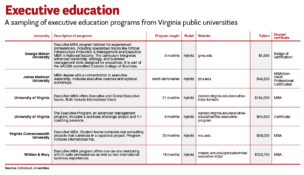Tech for b-schools
A.I. becomes part of colleges’ business curriculum
Richard Foster //December 31, 2018//
Tech for b-schools
A.I. becomes part of colleges’ business curriculum
Richard Foster //December 31, 2018//
On a weekend in late October, a group of 12 Virginia Tech executive MBA graduate students in Falls Church were tasked with solving the nation’s infrastructure ills using artificial intelligence tools.
With the help of representatives from companies such as Microsoft, Qlik and Tableau Software, the students used machine learning software to analyze data and make recommendations on how to fix the aging infrastructure.
One student group, for example, analyzed dam hazard classifications based on a real-life database of dams in Vermont. Inspecting dams requires a lot of manpower and can be cost-prohibitive, says Barbara Hoopes, an associate professor of business information technology at Virginia Tech’s Northern Virginia Center. The students’ analysis produced a system to prioritize potential hazards first.
At Virginia Tech’s weekend executive MBA program, the goal of teaching with machine-learning or business-intelligence tools is “not necessarily to turn the students into … data scientists but into what you might call savvy consumers of data science,” says Hoopes. “If these MBA-level students are going to be out there as managers … we want them to know the power associated with machine learning and artificial intelligence and how they could use that most effectively within their organizations.”
As artificial-intelligence and machine-learning algorithms become more prevalent, these high-tech tools — once the domain of engineering and information technology students — increasingly are becoming part of the curriculum at Virginia’s business schools.
That trend takes the form of undergraduate degrees in business analytics and MBA programs that teach the concepts behind business applications for A.I. and advanced technologies such as neural nets and deep learning — advanced computing systems, loosely based on the human brain, that learn by example to complete complicated tasks and solve problems.
The College of William & Mary offers an undergraduate major in business analytics as well as a hands-on technical course that teaches students programming techniques to create machine-learning models. However, like Tech, William & Mary’s MBA program also teaches its graduates about A.I. and machine learning in the context of using the tools to make business decisions.
“The idea is that perhaps these students aren’t going to be rolling up their sleeves and spending 24 hours a day building detailed decision models, but they certainly will be either managing people that are doing that or, far more importantly, receiving the wisdom of people that are doing that and are using arguments that involve that kind of technology, so they’ve got to really become critical consumers of that, managerially,” says David Murray, a clinical associate professor of business operations at William & Mary’s Raymond A. Mason School of Business. “It’s somewhat less technical [than the undergrad degree] but somewhat more tactical.”
Virginia Commonwealth University offers two graduate programs in analytics, including a decision analytics degree for executive MBA students. “We define analytics to be the process of leveraging data to support business decision making. … That includes both traditional statistics as well as more advanced modeling techniques such as machine learning and data mining,” says Paul Brooks, an associate professor of supply chain management and analytics at the VCU School of Business.
VCU’s program, Brooks says, emphasizes how to take insights received from data analysis “and turn them into actionable intelligence that people use to make decisions.”
The use of machine-learning tools to analyze business data will become increasingly ubiquitous in various industries and already is being used extensively in marketing and social media, industries that are leading the way, Brooks says.
Also, says Cliff Ragsdale, Virginia Tech’s Bank of America Professor of Business Information Technology, “more and more companies are developing point-and-click kinds of software tools that bring the power of A.I. and machine learning to pretty much anybody who wants to use it. … Thirty years ago, if you wanted to do neural networks, you had to write code from scratch to do it.”
A.I. is commonly used these days to automate rote tasks that were previously the domain of human workers, such as processing call-center requests, Brooks says. But the future of A.I. is deep learning, an advanced type of machine learning in which a computer can process enormous amounts of information from unstructured data sources, such as video, images and texts, and learn with minimal guidance to discern behavioral patterns or recognize objects or individuals. While still in its infancy, deep learning technology could be used for everything from replacing customer service agents to allowing autonomous cars to recognize other vehicles and pedestrians and make split-second driving decisions.

Some experts, such as tech billionaire Elon Musk, warn that humanity is facing a coming “singularity,” a social upheaval caused by artificial super-intelligence. Musk goes as far as to say that A.I. has the potential to destroy the human race.
Korinek agrees that society is unprepared for the coming of hyper-intelligent A.I. but in the near term, he says, people need to contend with the notion that almost any job could be replaced by A.I. — even in creative fields.
“We really have to be prepared for the fact that ultimately a lot of the things that we thought were exclusively human activities and tasks will also be automated … in the coming decades,” he says.
“Not everybody needs to be a master programmer, but to be successful we need a rudimentary understanding of how A.I. works, a rudimentary understanding that ultimately no domain will be completely immune from advances in A.I., and it’s always the case that those who are frontrunners in employing new technologies will be the most successful,” he says.
C

















